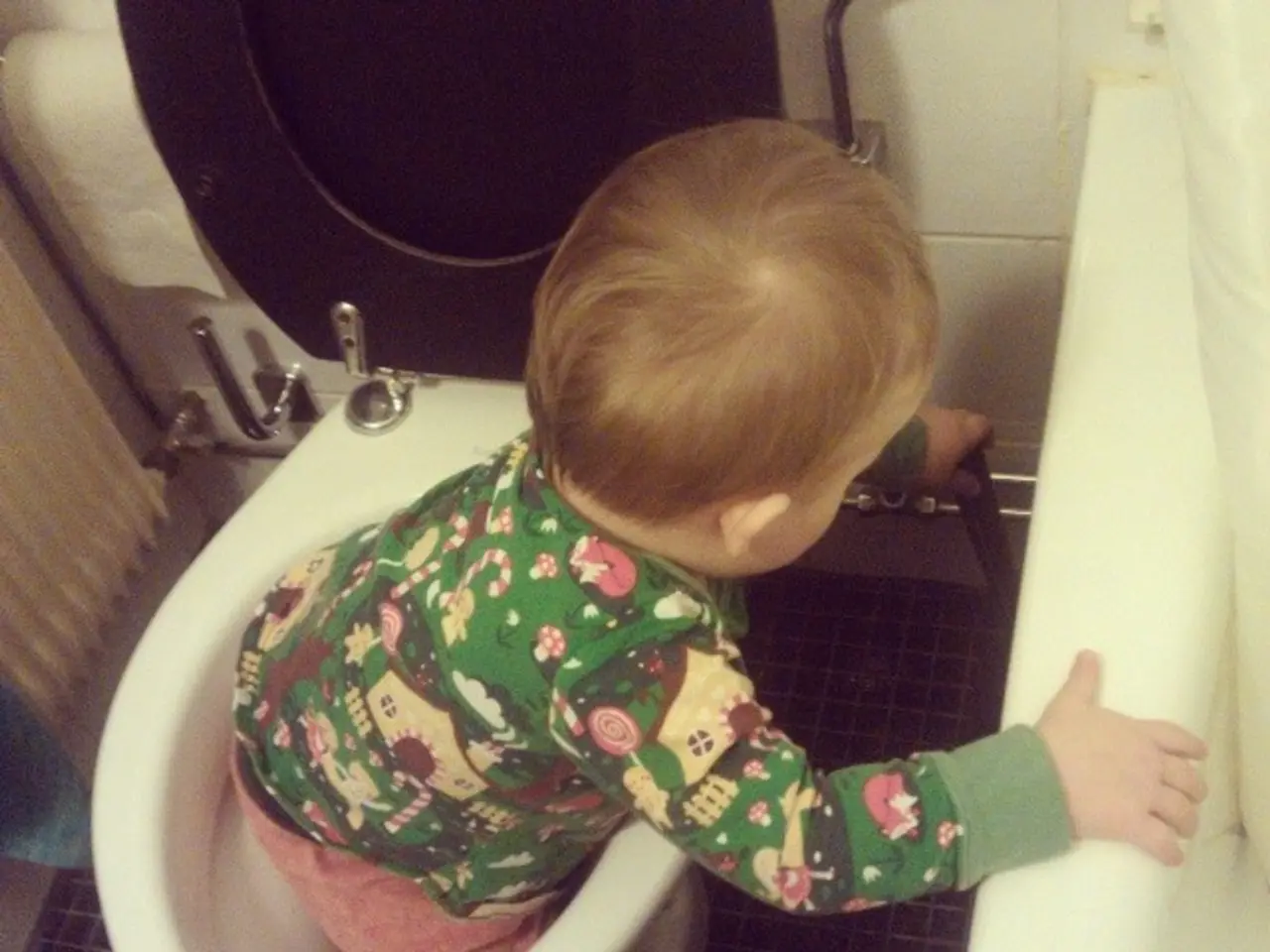Discovering Solutions: Alleviating Constipation in Children
In the journey of potty training, constipation can be a common challenge for young children. To prevent and treat this issue, it's essential to focus on a combination of key strategies.
Firstly, ensuring adequate hydration is crucial. Offer your child plenty of fluids daily, favouring water and limiting caffeine-containing drinks such as soda or sports drinks. This helps keep stools soft and easy to pass [2][4].
A high-fiber diet also plays a significant role. Include a variety of high-fiber foods in your child's meals, such as fruits, vegetables, whole grains, beans, and sorbitol-containing juices like prune and apple juice [2]. Some children might benefit from fiber supplements, but it's best to consult a healthcare provider before starting any supplement regimen.
Regular physical activity is another key element. Physical exercise stimulates intestinal movement, assisting normal bowel function [2]. Encourage your child to engage in activities they enjoy, whether it's playing, dancing, or going for walks.
Establishing a consistent toileting routine is equally important. Set a regular daily time for bowel movements, encouraging your child to sit on the toilet for about 10 minutes, even if they don't feel the urge. This routine can help train the body and reduce discomfort that might lead to withholding behaviors and constipation [2].
For children struggling specifically to poop in the toilet, targeted strategies may include assessing underlying causes like pain or fear, timing attempts around natural bowel patterns, and making the bathroom experience more comfortable [3].
Adopting a child-oriented, readiness-based potty training approach, starting around age 2, can help reduce residual constipation issues by respecting the child's physiological and psychological readiness [1].
When constipation occurs, gentle management and, if needed, medical advice, can resolve symptoms and help complete toilet training successfully. Oral laxatives can help get children unplugged, and medications like polyethylene glycol can soften stool. However, it's important to consult with a pediatrician to determine the best medication and dosage for constipation treatment [4].
Remember, building good habits and retrain children's bodies takes time. Be patient and persistent, and seek professional advice when needed. Symptoms of constipation in children may include going a couple of times a week or less, dry, hard stools, pain with pooping, straining, putting off using the bathroom, poor appetite, stomachache, or bloating [4].
In conclusion, preventing and treating constipation during potty training involves a well-rounded approach that includes adequate fluids, high-fiber diet, physical activity, regular toileting routines, comfort measures, and a patient child-oriented training approach. With the right strategies in place, you can help your child overcome constipation and complete potty training successfully.
References:
[1] Ginsburg, K. R., et al. (2016). AAP policy statement: toilet training. Pediatrics, 137(4), e20160938.
[2] Meltzer, P. S., et al. (2017). Constipation in children: diagnosis and management. Pediatric Clinics of North America, 64(5), 875-887.
[3] Wong, R. W., et al. (2018). The role of the pediatrician in managing encopresis. Journal of Clinical Pediatrics, 67(9), 1120-1125.
[4] American Academy of Pediatrics. (2020). Constipation in children. HealthyChildren.org. https://www.healthychildren.org/English/health-issues/conditions/digestive-diseases/Pages/Constipation-in-Children.aspx
- To maintain a healthy lifestyle during the potty training process, a balanced diet rich in fibers from foods like fruits, vegetables, whole grains, beans, and certain juices should be incorporated.
- Beyond food, incorporating regular exercise and physical activity into your child's routine, such as playing or dancing, can assist in maintaining good digestive health, thereby preventing or easing constipation.
- Furthermore, promoting mental health and well-being in parenting could help in overcoming potty training challenges and reducing constipation, as a child's physiological and psychological readiness matters.
- Engaging in health-and-wellness measures, like providing adequate fluids, especially water, and staying away from caffeine-containing beverages, helps ensure soft and easily passable stools.
- Remember that continuity is key in establishing good habits — strategies like setting consistent toileting routines, consulting healthcare providers in case of constipation, and offering gentle, yet effective treatments when necessary, play important roles in successful potty training.




